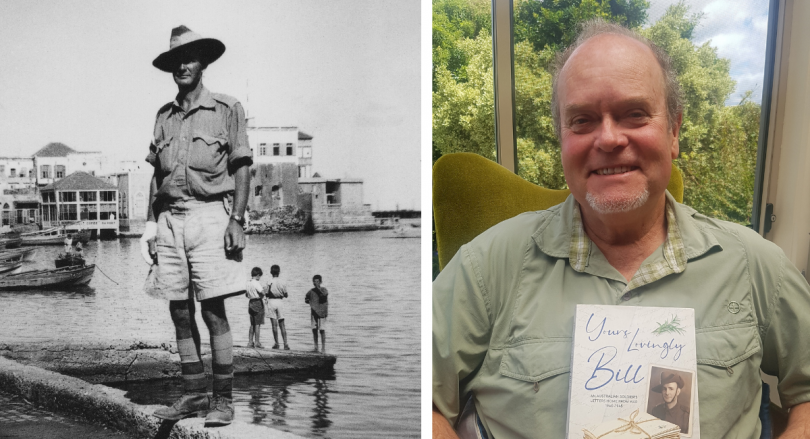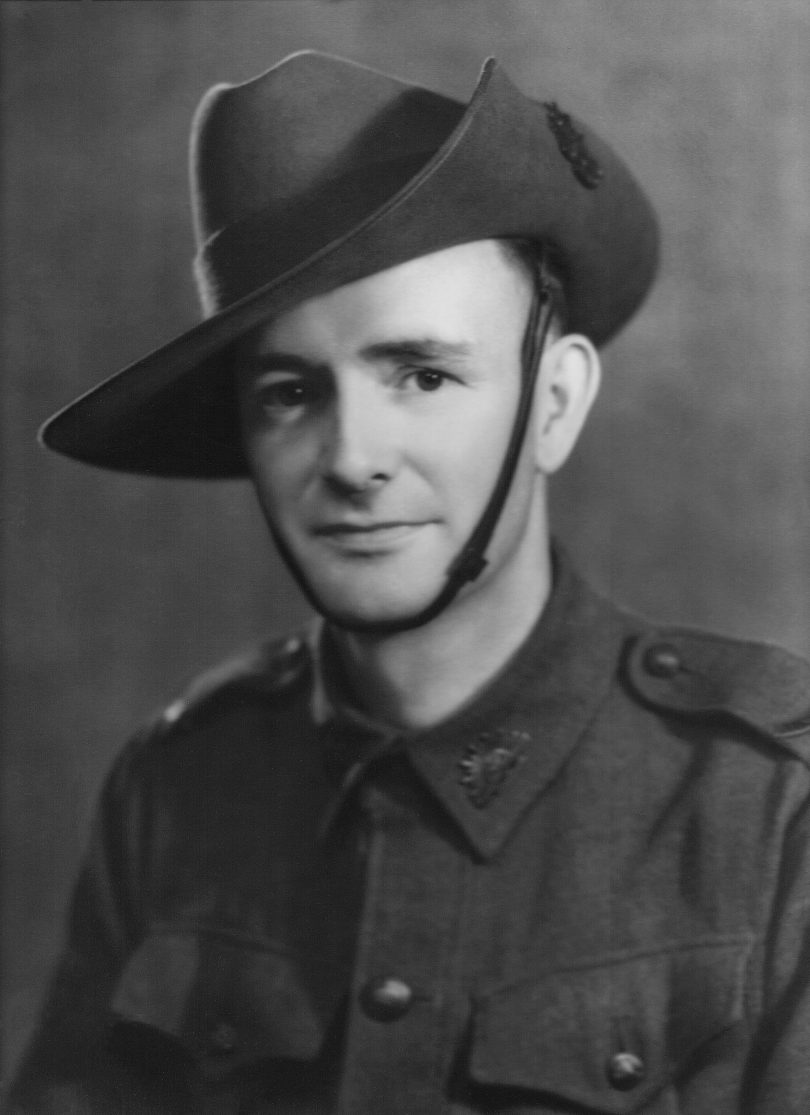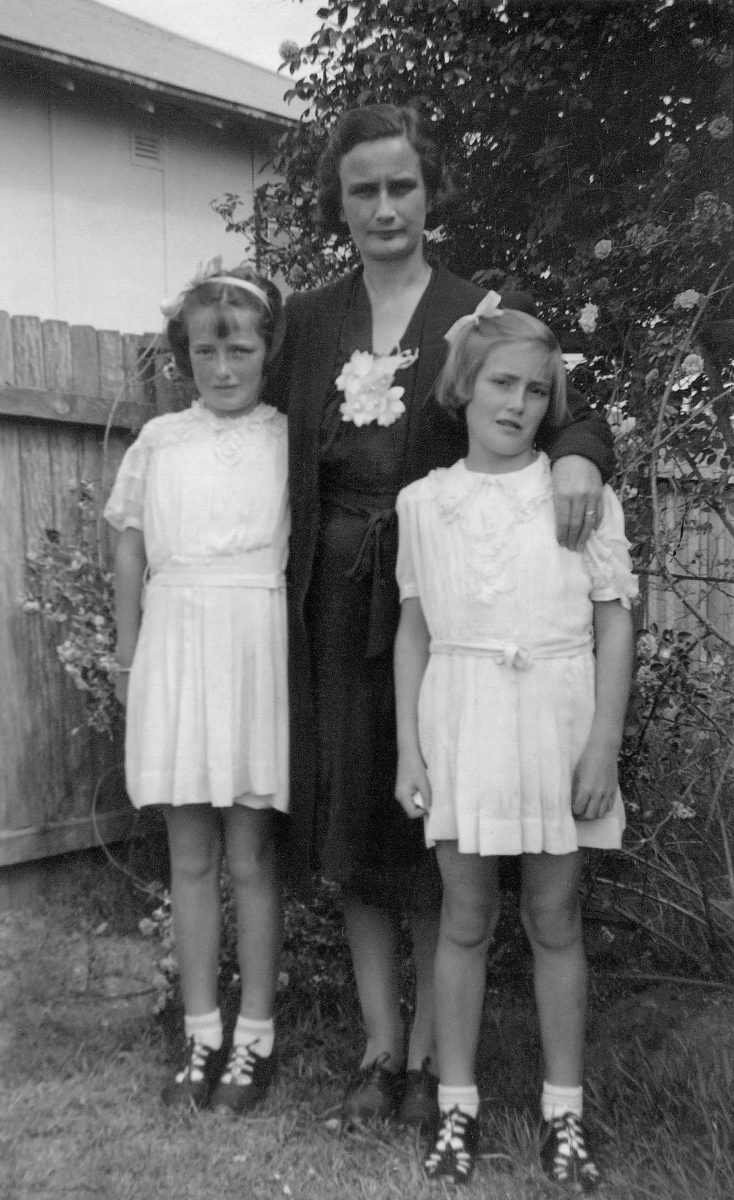
Left: World War II solider Bill Corby with an injured hand at Elmina, near Tripoli, in Libya. Right: Greg Bartlett holding a copy of his new book, Yours Lovingly Bill. Photos: Supplied.
The letters of a solider who served on World War II’s Western Front and Eastern Front, that were written to his family back home, demonstrated such love he had for his wife and daughters that a Bega Valley author was inspired to publish them in a book.
Greg Bartlett, from Tura Beach on the NSW South Coast, has released his book, Yours Lovingly Bill, using the 300 letters written by his wife’s grandfather, Bill Corby, during the five years he spent as a signaller in the Australian army.
“It is the story of an ordinary man’s dedication to his family, his love, his endurance and his persistence,” says Greg.
“It’s the voice we don’t hear much today, that of quiet humility, acceptance and a dry sense of humour.
“He was very committed to the idea there would be a life after the war.”
For instance, in one of his last letters to his wife, Thelma, he wrote: “What do you mean the best five years of our lives have gone? I’ll show you when I get back that life is only just beginning. We have such a lot of things to do, honey. We have one advantage, at least we have a start.”

Soldier Bill Corby served during World War II. Photo: Supplied.
Bill was 33 when he joined the First Australian Imperial Force (AIF), leaving behind his daughters, Dawn, 10, and Fay, 8. Because he was only able to see his family for a dozen weeks on leave during the years he was in the army, the letters became an important form of connection between them.
“He said he didn’t want to write about war as war,” says Greg. “I think his intention was to protect his family from the realities of war.”
Because the letters were censored by the government, Greg says he had a stroke of luck when he found Bill’s notebook detailing 14 months of his service from the time he first boarded a ship to leave to when he was in the Middle East, where he was able to write in more explicit detail.
“He talks in great depth about some of the terrible experiences he had in Greece and Crete that he wouldn’t put into the letters because the government wouldn’t have let him,” says Greg.
For example, in his notebook Bill talks about escaping from Greece on a ship called Costa Rica, but when the ship was hit by a German plane and started to sink they had to jump to a destroyer anchored nearby.
Greg says in the letters he described it as a “dip in the brine” to his family, but the notebook showed it was a much more terrifying experience.

Bill Corby’s wife, Thelma, and children, Dawn and Fay, at his departure for the war. Photo: Supplied.
The letters show Bill and Thelma were very close, although they did have moments of friction, such as when Bill described US soldiers as glamorous, overpaid and described women dating them as “low as a snake’s belly”, or when he talked about how he did not believe conscripted Australian soldiers deserved the same pay as those in the AIF.
It was also clear from the letters that Bill was a very doting father, says Greg, and sadly he missed a huge portion of his daughters’ lives because by the time he returned home for good they had grown from young children to teenagers.
Fay, Greg’s mother-in-law who moved to Bega in 1986, reported to him that Bill was a changed man after the war. He was deeply affected, had mood swings and drank.
He was diagnosed with cancer in 1959 and spent the last part of his life appealing to the Repatriation Board to see if there was some way it could look after Thelma once he was gone. However, he died before it came to a decision.
Greg says people could learn about the idea of endurance from Bill’s story.
“This generation had a job to do and they paid the price of separation, but they were committed to it,” he says.
You can buy Yours Lovingly Bill at the Australian War Memorial in Canberra, or at Candelo Books in Bega.







